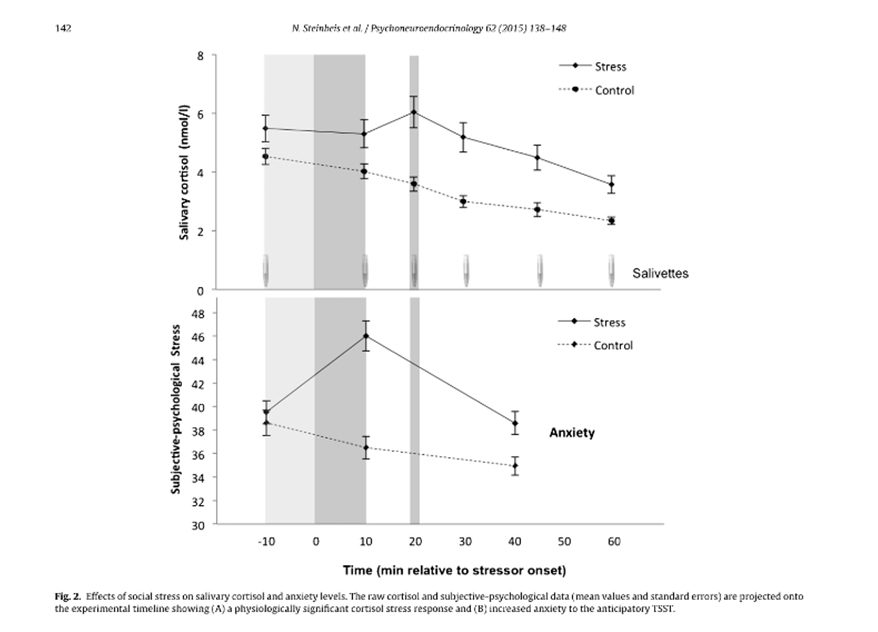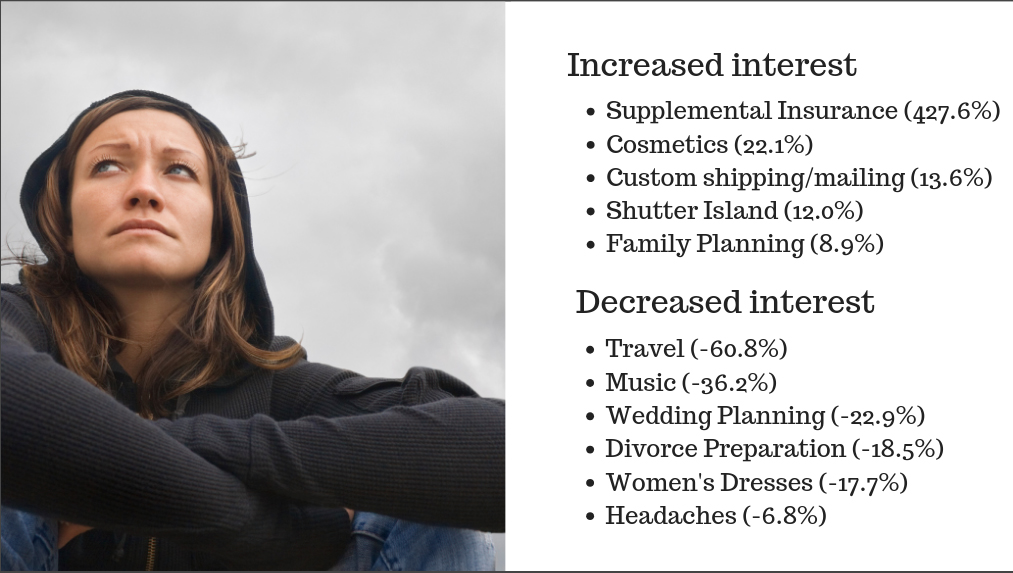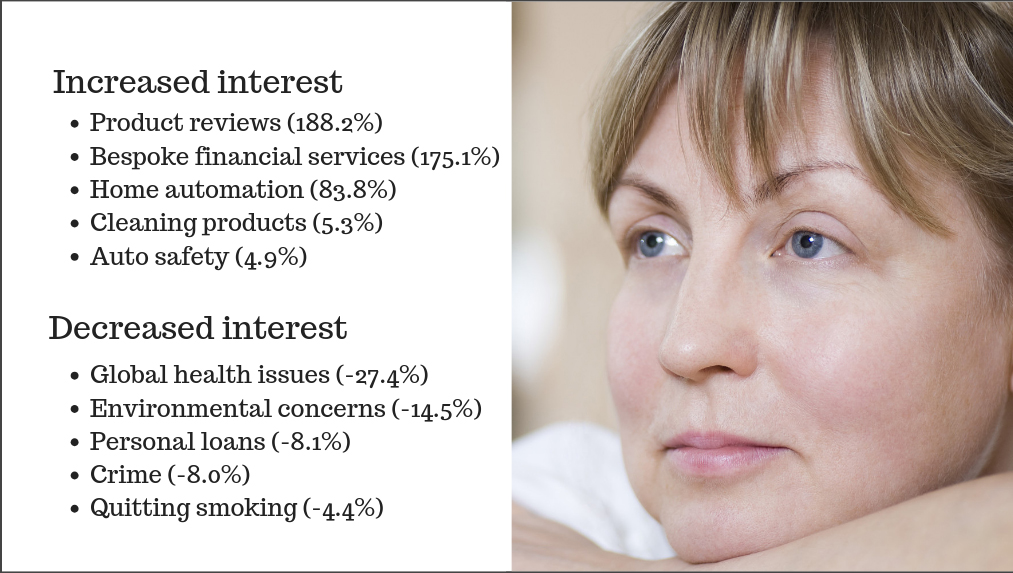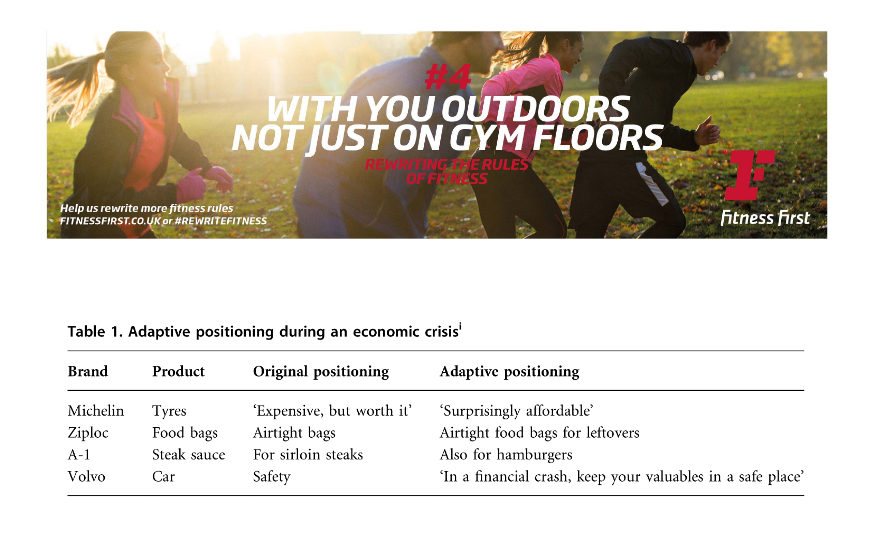In an age of anxiety (recession, Brexit, Trump), how can brands ‘ride the wave’ of changing consumer behaviour? Using its own data looking into consumer behaviour, Exponential shows that marketers’ initial reaction in times of crisis – to pull an advert – is not necessarily the way forward.
Advertising intelligence and digital media solutions provider, Exponential, hosted an insights session in London this month to explore how consumer behaviour alters in times of anxiety.
Exponential’s Global VP of Insights and Strategy, Bryan Melmed  (pictured), hosted the event aimed at advertising industry insiders and brand marketers. Using real life examples of consumer behaviour from before and after the Brexit vote, the Trump election and other significant events from the past few years, he he discussed patterns and changes in consumer purchasing habits and behaviour in an age of anxiety.
(pictured), hosted the event aimed at advertising industry insiders and brand marketers. Using real life examples of consumer behaviour from before and after the Brexit vote, the Trump election and other significant events from the past few years, he he discussed patterns and changes in consumer purchasing habits and behaviour in an age of anxiety.
Stress versus Anxiety
Using data from a psychological experiment on anxiety to highlight the difference between stress and anxiety, Melmed explained that when a person is anxious it’s often due to the individual having a low certainty over what’s going to happen. Additionally, anxiety is often subconscious, resulting in many individuals failing to recognise they are in a state of anxiety, which can still have an impact on behaviour and the choices they make.
Narrowed perception
Anxiety affects consumers in a number of ways and, in particular, the way that they perceive the world around them. A narrowed perception leads to audiences becoming so focused on their own internal thoughts and concerns, that the outside world tends to be blurred or ignored.
Melmed said: “When a consumer becomes increasingly more anxious, they develop a narrowed perception and become less aware of the world around them. This makes these particular consumers harder to reach as they become reluctant to taking risks. Their behaviour becomes more static as they make fewer choices or alter their habits.”
He added: “This is a significant challenge for marketers as they try to gain the attention of those anxious consumers, so it’s important to adapt active campaigns to reach them.”
A need to re-gain control in age of anxiety
Consumers retreat from uncertainty in anxious times and tend to be drawn to products that give them a greater sense of control, such as cleaning products and life insurance. After the Brexit vote in 2016, Exponential’s data found that there was an increased interest in supplemental insurance (427.6%), whereas there was a decrease in interest in non-essentials such as travel (-60.8%) and wedding planning (-22.9%).
 Additionally, 62% of anxious consumers say they prefer informational or comparative advertisements, with 59% of consumers saying they found brand-heavy advertisements “frivolous”. Exponential’s data demonstrated the importance of how marketers should be utilising informational advertising within campaigns in order to make the consumer feel like they are in control.
Additionally, 62% of anxious consumers say they prefer informational or comparative advertisements, with 59% of consumers saying they found brand-heavy advertisements “frivolous”. Exponential’s data demonstrated the importance of how marketers should be utilising informational advertising within campaigns in order to make the consumer feel like they are in control.
Melmed said: “Anxious consumers look to brands for information and emotional reassurance. In these times, brands and advertisers should be taking a more informational approach when creating their campaigns to reposition their products as giving control back to the consumers. This is a great opportunity for digital in particular as these campaigns have the ability to offer interactivity that allows consumers to find out more information.”

Persevering through anxiety
In times of anxiety, marketers’ immediate reaction is to often cut budgets or postpone campaigns during tumultuous periods. However, these periods offer a valuable opportunity for marketers to come out on top. Times of anxiety impact on consumer behaviour so significantly that they can shift the balance towards those brands that ‘ride the wave’.
Melmed said: “The initial reaction in times of crisis is to pull an advert. However, our data is showing that consumers look for more communication from brands during a time of anxiety and, during this time, it is key to continue advertising efforts.:
Exponential’s data has found that marketers who cut budgets during a crisis will see an increase in revenue of up to 44% and an increase in profit of up to 30% once the crisis has ended. Whereas marketers who keep advertising in tough times will see an increase in revenue of up to 200% and an increase in profit of up to 75% once the crisis has passed.
Melmed added: “Ultimately, marketers who maintain spend in a crisis are more likely to gain market share and more revenue once that spike of anxiety is over.”
Read also:
Neuroscience in the marketers’ toolkit – when and why?
What can science of the subconscious teach marketers and designers?


 (pictured), hosted the event aimed at advertising industry insiders and brand marketers. Using real life examples of consumer behaviour from before and after the Brexit vote, the Trump election and other significant events from the past few years, he
(pictured), hosted the event aimed at advertising industry insiders and brand marketers. Using real life examples of consumer behaviour from before and after the Brexit vote, the Trump election and other significant events from the past few years, he 

 Additionally, 62% of anxious consumers say they prefer informational or comparative advertisements, with 59% of consumers saying they found brand-heavy advertisements “frivolous”. Exponential’s data demonstrated the importance of how marketers should be utilising informational advertising within campaigns in order to make the consumer feel like they are in control.
Additionally, 62% of anxious consumers say they prefer informational or comparative advertisements, with 59% of consumers saying they found brand-heavy advertisements “frivolous”. Exponential’s data demonstrated the importance of how marketers should be utilising informational advertising within campaigns in order to make the consumer feel like they are in control.




Leave your thoughts